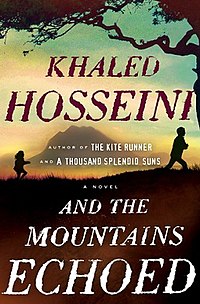And the Mountains Echoed
by Khaled Hosseini
The novel opens in the year 1952. Saboor, an impoverished farmer from the fictional village of Shadbagh, decides to sell his three-year-old daughter Pari to a wealthy, childless couple in Kabul. Abdullah adores Pari, and helps collect various feathers for her which she loves. Once, he sold a pair of his shoes for a peacock feather because he knew Pari would treasure it. Ignorant of his father's plans, 10 year old Abdullah, who has raised Pari since their mother died giving birth to her, insists on following when his father departs from the village to Kabul with Pari. After slapping and ordering him to return to the village several times, Saboor finally relents and allows Abdullah to come along on the condition that no tears be shed. While camping out for the night, Saboor tells the children a story about another poor farmer who was forced to give up a beloved child, but the significance of the tale doesn't register with Abdullah. It is only after they arrive at the home of the adoptive parents in Kabul and he visits a bazaar to buy things for Pari that Abdullah realizes what is happening. He pleads and wails against Saboor's rule that he could not cry in Kabul as Ms. Wahdati tries to assure him that the arrangement is for the best and he will understand when he is older. Abdullah keeps Pari's box of feathers safe.
Subsequent chapters expound on how the arrangement came to be: the children's stepmother, Parwana, grew up as the less-favored child to her beautiful twin sister Masooma. One day, in a flash of jealousy because Masooma and Saboor were to be wed, she pushed Masooma out of a tree resulting in paraplegia. Parwana subsequently spent several years caring for her sister until the latter asked her to help her commit suicide and to then marry Saboor. At Masooma's request Parwana takes Masooma out to the middle of nowhere and leaves her there. Their older brother, Nabi, left to work for Mr. Wahdati, a wealthy man in Kabul, and became infatuated with his wife, Nila. After Nila expressed dismay about her inability to have children, Nabi arranged for Pari to be sold to the couple, because Parwana has given birth to a son and Saboor cannot support 3 children. After Pari is sold in Kabul, Nabi is no longer welcome in the village.
In the ensuing years, Abdullah leaves Afghanistan. Mr. Wahdati suffers a stroke, prompting Nila, who had a French mother and spoke fluent French, to take Pari and move to Paris, France. Nabi, while assuming the role of Wahdati's primary caregiver, finds a number of sketchbooks in Wahdati's closet filled with pictures of him drawn before the stroke. Unnerved by the discovery that Mr. Wahdati loves him, he resolves to leave but decides against it after he is unable to find someone suitable to take over for him. Nabi subsequently spends the next 50 years working for Mr. Wahdati. He develops a deep bond with his employer, and Nabi comes to the realization that his purpose is to take care of Mr. Wahdati. Later Mr. Wahdati's health deteriorates further, and Nabi helps him commit assisted suicide by kissing him on the lips and pressing a pillow over his face.
Wahdati's neighbors, meanwhile, move to the United States with their children after the Soviet invasion. Cousins Idris and Timur return to Afghanistan over two decades later in 2003 to reclaim their family's property. While there, Timur makes a great show of publicly distributing money to street beggars while Idris privately bonds with Roshi, an Afghan girl who suffers from a horrific injury and whose family was murdered by her uncle. Idris at first promises to arrange for Roshi to undergo the operations needed for her recovery but distances himself from her and Afghanistan on returning to the States. Several years later, Idris comes across Roshi signing copies of her bestselling memoir, which she has dedicated to her adoptive mother and Timur, who paid for her surgery.
Nila, now living in Paris, is unhappy for much of her life, taking up a number of lovers and beginning to refer to the plain and practical Pari as her "punishment". She commits suicide in 1974 after giving a detailed interview about her early life. Pari suspects that she is not Nila's biological daughter and plans a trip to Afghanistan to explore her heritage. However, she postpones it indefinitely after marrying and becoming pregnant. After having three children and being widowed at the age of 48, she receives a posthumous letter from Nabi in 2010, at the age of 63, detailing the circumstances of her adoption by the Wahdatis.
Later chapters focus on Adel, a boy learning that his father is a war criminal and that his house is built on the land that previously belonged to Saboor, and Markos, a Greek aid worker in Afghanistan and acquaintance of Nabi. In this chapter, Iqbal, Saboor's and Parwana's son, is an older man and he tries to obtain the documents proving he is the owner of the land, but Adel's father pays off a judge to say they were burned in a fire. Outraged and upset, Iqbal marches to Adel's home and throws a rock through the window. Adel's father "deals" with Iqbal, and Adel is convinced his father has him killed.
In the final chapter, narrated by Abdullah's daughter, also named Pari, Abdullah and Pari are reunited in California after more than 50 years apart. However, he is suffering from Alzheimer's disease and is unable to remember her echoing the conclusion of the story their father told them so many years ago as children on their last night together in Afghanistan. Abdullah's daughter finds the box of feathers and gifts it to Pari, although she does not remember the significance of the feathers, she is touched that Abdullah has kept her in mind all these years.
